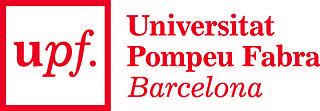
Pompeu Fabra University is a public university located in the city of Barcelona, Catalonia in Spain. In 2021, it was ranked the best university in Spain and 10th best young university in the world by the Times Higher Education World University Rankings, as well as best university by the U-Ranking of Spanish Universities. The university was created by the Autonomous Government of Catalonia in 1990, and was named after the linguist Pompeu Fabra, an expert on the Catalan language.
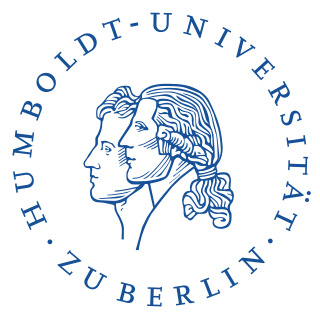
Humboldt University of Berlin is a public research university in the central borough of Mitte in Berlin, Germany. It was established by Frederick William III on the initiative of Wilhelm von Humboldt, Johann Gottlieb Fichte and Friedrich Ernst Daniel Schleiermacher as the University of Berlin in 1809, and opened in 1810, making it the oldest of Berlin's four universities. From 1810 until its closure in 1945, it was named Friedrich Wilhelm University. During the Cold War the university found itself in East Berlin and was de facto split in two when the Free University of Berlin opened in West Berlin. The university received its current name in honour of Alexander and Wilhelm von Humboldt in 1949.

The University of Macau is the only public research university in Macau. The UM campus is located in the east of Hengqin Island, Guangdong province in Mainland China, on a piece of land leased to the Macau SAR government, but is under the jurisdiction of Macau.
Tilburg University is a public research university specializing in the social and behavioral sciences, economics, law, business sciences, theology and humanities, located in Tilburg in the southern part of the Netherlands.

Erasmus University Rotterdam is a public research university located in Rotterdam, Netherlands. The university is named after Desiderius Erasmus Roterodamus, a 15th-century humanist and theologian.

The University of Regensburg is a public research university located in the medieval city of Regensburg, Bavaria, a city that is listed as a UNESCO World Heritage Site. The university was founded on July 18, 1962 by the Landtag of Bavaria as the fourth full-fledged university in Bavaria. Following groundbreaking in 1965, the university officially opened to students during the 1967–1968 winter semester, initially housing faculties in Law and Business Sciences and Philosophy. During the summer semester of 1968 the faculty of Theology was created. Currently, the University of Regensburg houses eleven faculties.
EBS Universität für Wirtschaft und Recht, more commonly referred to as EBS Universität or simply EBS, is a private, state-approved research university for business and law located in Wiesbaden and Oestrich-Winkel, founded in 1971. The university's activities focus on three core areas: undergraduate degree programs, postgraduate degree programs and executive education. The EBS Universität has the right to award doctorates and habilitations and is the oldest private university in Germany.

The University of Mannheim, abbreviated UMA, is a public research university in Mannheim, Baden-Württemberg, Germany. Founded in 1967, the university has its origins in the Palatine Academy of Sciences, which was established by Elector Carl Theodor at Mannheim Palace in 1763, as well as the Handelshochschule, which was founded in 1907.
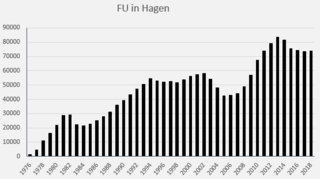
The University of Hagen is a public research university that is primarily focused on distance teaching. While its main campus is located in Hagen, North Rhine-Westphalia, Germany, the university maintains more than 50 study and research centers in Germany and throughout Europe. According to the Federal Statistical Office of Germany, it is Germany's largest university. The university was founded in 1974 as a public research university by the state Nordrhein-Westfalen and began its research and teaching activities in 1975. It was founded following the idea of UK's Open University to provide higher and continuing education opportunities through a distance education system in Germany.
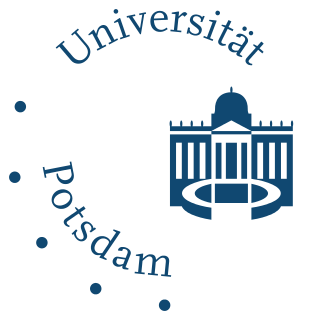
The University of Potsdam is a public university in Potsdam, capital of the state of Brandenburg, Germany. It is mainly situated across three campuses in the city. Some faculty buildings are part of the New Palace of Sanssouci which is known for its UNESCO World Heritage status.

The Kiel Institute for the World Economy is an independent, non-profit economic research institute and think tank based in Kiel, Germany. In 2017, it was ranked as one of the top 50 most influential think tanks in the world and was also ranked in the top 15 in the world for economic policy specifically. German business newspaper, Handelsblatt, referred to the Institute as "Germany's most influential economic think tank", while Die Welt, stated that "The best economists in the world are in Kiel".
Frankfurt School of Finance & Management is a private, non-profit business school in Frankfurt, Germany. The school offers bachelors, masters, MBA, doctoral, and executive education programs.
Zeppelin University is a small and highly selective private research university on the shores of Lake Constance in Friedrichshafen, Germany. It is named after the German general and airship constructor Ferdinand Graf von Zeppelin, whose foundation is the main financier of the university. The university was established in 2003 and is known for its avant-garde character as well as for its sophisticated method of selecting students. On 10. September 2011, ZU was granted the right to award doctorates and habilitation. Part of the grant includes the right to call itself a university.
Ivo Welch, is an American economist and finance academic. He is the J. Fred Weston Professor of Finance at UCLA Anderson School of Management. He completed his BA in computer science in 1985 at Columbia University, and both his MBA and PhD in finance at the University of Chicago.
The Faculty of Business and Economics is one of nine faculties at the RWTH Aachen University. It was found in 1986. Approximately 1,500 students are enrolled in the faculty. It was renamed in RWTH Aachen University School of Business and Economics in 2011.
Roman Inderst is a German economist who holds the chair for finance and economics at the Goethe University Frankfurt. His research interests include corporate finance, banking, competition policy, and information economics. According to the Handelsblatt, Inderst is the most influential German-speaking economist.

Robert Klaus Freiherr von Weizsäcker is a German economist and honorary president of the German Chess Federation. He has held the Chair of Economics, Public Finance and Industrial Organization at Technical University of Munich. He is the eldest son of the late former German President Richard von Weizsäcker (1920–2015).
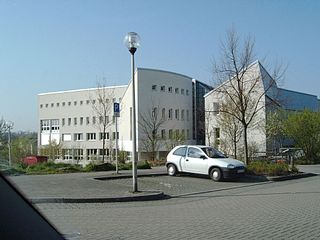
Witten/Herdecke University (UW/H) is a private, state-recognized, nonprofit university in Witten, North Rhine-Westphalia, Germany. It was the first German private institution of higher education to receive accreditation as a "Universität", a status recognizing the university's academic quality equivalent to state-run universities and granting the right to award bachelor's and master's degrees, doctorates and the German Habilitation.
Gerhardus Johannes "Gerard" van den Berg is a Dutch econometrician. He is professor of Economics at the Vrije Universiteit Amsterdam and the University of Bristol. He was awarded the 2009 Alexander von Humboldt Professorship at the University of Mannheim. His research lies in the fields of health economics and labour markets.

The Faculty of Economic, Social and Political Sciences and Communication (ESPO) is a faculty of the University of Louvain, located on the campuses of Louvain-la-Neuve, FUCaM Mons and UCLouvain Charleroi. It originates in the School of Political and Social Sciences founded by Jules Van den Heuvel in Louvain in 1892. With over 6000 students, it is UCLouvain's largest faculty.















